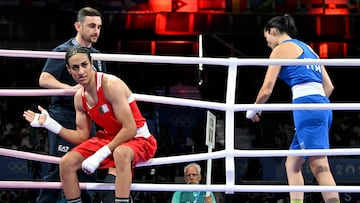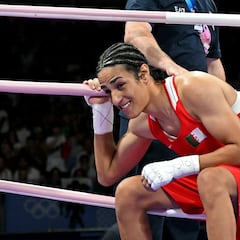Are transgender athletes allowed to compete in boxing at the Olympics?
Boxer Imane Khelif has sparked a debate after defeating his rival in less than a minute.

An intense debate broke out in one of the first events on day 5 of the Paris 2024 Olympic Games. The Algerian boxer Imane Khelif, defeated her rival, the Italian Angela Carini, in 46 seconds in the women’s 145-pound (66 kg) category!
The first match of the round of 16 began when Khelif connected a solid right hand in the Italian’s face. After a short period of decision, Carini withdrew from the match in under a minute, and the Algerian advanced to the next round. “I received two blows on the nose, and I couldn’t breathe anymore; it hurt me terribly. I went to Maestro Renzini, and with maturity and courage, I said enough.” said the Italian boxer after the match.
More: Imane Khalif’s amateur and pro boxing record
Although Carini and his coach did not want to generate controversy with their statements after the fight, the truth is that the criticism about Khelif’s eligibility for the Olympic Games did not take long to reach social media channels. Even Italy’s prime minister, Giorgia Melloni, said, “From my point of view, this was not a competition on equal terms.”
However, Imane Khelif’s case is not the only one in the female boxing category since Lin Yu-ting, representing Taiwan, is another boxer who, according to the International Boxing Association (IBA), has XY chromosomes. The problem is that both boxers were previously disqualified from the 2023 Boxing World Championships. IBA president Umar Kremlev said the decision was made because “athletes were discovered trying to deceive their colleagues and pass themselves off as women.”
Why are transgender athletes allowed to box in the Paris 2024 Olympics?
The International Olympic Committee (IOC), which organizes the games every four years, doesn’t have specific regulations about transgender participation. Instead, the IOC established a 12-point guideline, highlighting that athletes must transition before age 12 to prevent disadvantages.
What’s more, the organization establishes that the international federations are responsible for selecting each sport’s eligibility criteria. In boxing’s case, the IOC doesn’t recognize the IBA, so the criteria are not related.
Considering Khelif and Yu-ting’s cases, the IOC defended the boxers. The Committee’s spokesman, Mark Adams, highlighted, “All those competing in the women’s category meet the eligibility criteria. They are women in their passports, and it’s stated that this is the case, and they are female.”
How many transgender athletes are competing at Paris 2024?
At the Tokyo 2020 Olympic Games, New Zealand weightlifter Laurel Hubbard became the first transgender athlete to compete in the Olympic Games in the 191 pounds (87kg) category. Another trans athlete to participate in the last edition of the Olympics was the Canadian soccer player Quinn, who also participates in Paris 2024.
Apart from Quinn, Khelif, and Yu-ting special cases, no transgender athlete will participate in the Paris 2024 Olympic Games. It should be noted that the case of USA track and field athlete Nikki Hiltz does not count since, despite being transgender and non-binary, she has always competed in the female category, and for the IOC, she physically counts as a woman.
What Olympic sports allow trans athletes?
Since the IOC determined that the eligibility criteria depend on the federations and each sport, some are stricter regarding the athlete’s eligibility criteria.

Related stories

Imane Khelif poses question for IOC

Alcaraz into Olympic semis after downing Paul
Athletics, cycling, swimming, rugby, and cricket organizations restrict participation in their female categories if they undergo puberty before starting their transition.
Sports like triathlon, tennis, and archery require athletes’ testosterone levels to be below a certain level to allow participation. Others like soccer and badminton consider trans athletes’ participation on a “case by case” basis.
Complete your personal details to comment